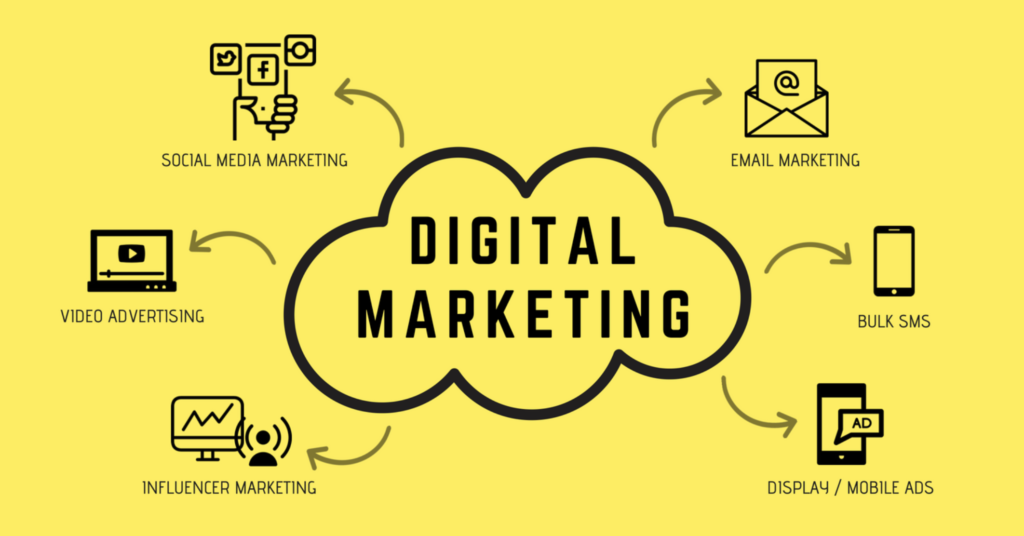
Digital marketing involves promoting products, services, and brands through digital platforms such as websites, search engines, social media, email, and online advertising. By utilizing the internet and digital technologies, businesses can effectively connect with their target audience and expand their reach globally. Unlike traditional marketing, which depends on physical media like newspapers, television, and billboards, digital marketing offers real-time data, audience insights, and performance tracking. This allows marketers to fine-tune their strategies, optimize campaigns, and achieve better returns on investment. A significant advantage of digital marketing is its ability to target specific audiences based on demographics, interests, behaviour, and location. Businesses can craft personalized and relevant marketing messages to engage different customer segments effectively. Moreover, digital marketing is cost-efficient, making it a viable option for businesses of all sizes. While small businesses can execute budget-friendly campaigns, large enterprises can scale their efforts using advanced digital strategies. The adaptability of digital marketing enables brands to experiment with different approaches, track outcomes, and make real-time adjustments for improved performance. Another key feature of digital marketing is its capacity to facilitate direct interaction between brands and consumers. Social media platforms, email marketing, and online communities provide businesses with opportunities to build strong relationships, enhance customer loyalty, and gather valuable feedback. Unlike traditional marketing, which often relies on one-way communication, digital marketing fosters meaningful conversations with customers, allowing businesses to address concerns, answer queries, and build trust. Furthermore, digital marketing has transformed the way businesses approach branding, lead generation, and sales conversions. With billions of people active on the internet daily, brands can leverage digital channels to boost visibility, drive website traffic, and increase sales. The incorporation of artificial intelligence, automation, and data analytics has further refined digital marketing strategies, enabling predictive analysis, personalized recommendations, and enhanced user experiences. As technology continues to advance, digital marketing remains an essential tool for businesses striving to succeed in an increasingly digital-driven world.
An Overview of Digital Marketing
In today’s digital era, businesses harness online platforms to connect with their target audience effectively. Digital marketing includes all strategies that utilize the internet and electronic devices to promote products and services. Companies leverage various digital channels such as search engines, social media, email, and websites to engage potential customers. Digital marketing is essential because it provides cost-effective, targeted, and measurable solutions compared to traditional marketing techniques.
The Evolution of Digital Marketing
The journey of digital marketing has transformed drastically over time. Initially, it started with basic email marketing and banner advertisements. As search engines like Google gained dominance, SEO and PPC advertising became pivotal. The emergence of social media platforms such as Facebook, Instagram, and LinkedIn further reshaped the landscape, enabling brands to interact with audiences in real time. Today, digital marketing is data-driven, incorporating artificial intelligence (AI), machine learning, and automation to refine marketing strategies.
7 Essential Elements of Digital Marketing
Digital marketing comprises multiple crucial components that work collectively to craft a comprehensive online marketing strategy. These key aspects include:
- Search Engine Optimization (SEO)
- Search Engine Marketing (SEM)
- Content Marketing
- Social Media Marketing (SMM)
- Pay-Per-Click (PPC) Advertising
- Email Marketing
- Affiliate & Influencer Marketing
Search Engine Optimization (SEO)
SEO involves optimizing a website for higher rankings in search engine results pages (SERPs). It includes on-page SEO (keyword usage, meta tags, and high-quality content), off-page SEO (backlink building and social credibility), and technical SEO (site speed, mobile optimization, and structured data). A strong SEO strategy enhances website visibility, drives organic traffic, and improves user experience.
Social Media Marketing (SMM)
SMM entails utilizing platforms such as Facebook, Instagram, Twitter, LinkedIn, and TikTok to promote brands and engage users. Businesses create and distribute content, run paid ad campaigns, and interact with audiences to boost brand awareness and customer loyalty. Influencer partnerships, live sessions, and interactive content significantly contribute to effective social media strategies.
Pay-Per-Click (PPC) Advertising
PPC advertising allows businesses to bid for top positions on search engines and social media platforms. Google Ads and Facebook Ads are widely used PPC platforms that enable advertisers to target specific demographics, interests, and locations. PPC campaigns help companies generate immediate traffic and conversions, making them an excellent tool for short-term marketing goals.
Content Marketing
Content marketing focuses on creating and sharing valuable content to attract and retain audiences. Popular formats include blogs, videos, infographics, podcasts, and e-books. Quality content not only educates users but also strengthens brand authority, enhances SEO, and drives engagement.
Email Marketing
Email marketing remains an effective method for lead nurturing and customer engagement. Businesses implement personalized email campaigns, newsletters, and automated sequences to maintain customer relationships. Effective strategies include segmentation, A/B testing, and crafting compelling subject lines to improve open rates and click-through rates.
Affiliate & Influencer Marketing
Affiliate marketing involves businesses collaborating with individuals or organizations who promote products and earn commissions from sales made through their referrals. Influencer marketing leverages social media personalities to endorse brands, expanding reach and credibility. Both methods are excellent for increasing brand awareness and conversions.
The Future of Digital Marketing
Emerging trends and technologies are shaping the future of digital marketing. Some notable developments include:
- Artificial Intelligence (AI) & Automation: Enhancing marketing personalization and efficiency.
- Voice Search Optimization: Tailoring material for voice-activated searches.
- Video & Interactive Content: Engaging audiences through short-form videos and augmented reality (AR).
- Data Privacy & Security: Adhering to regulations such as GDPR for customer data protection.
- Omnichannel Marketing: Seamlessly integrating multiple digital touchpoints for a cohesive user experience.
Conclusion
Digital marketing is continuously evolving, offering businesses numerous opportunities to expand their reach and improve engagement. Understanding its key components and staying ahead of emerging trends enables companies to develop successful digital strategies. Whether through SEO, social media, content marketing, or paid advertising, digital marketing remains an indispensable tool in today’s competitive business landscape. Learn more about Digita Marketing On Digitalnerdhub.com
Follow us on Facebook
